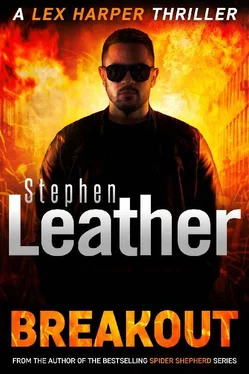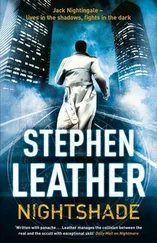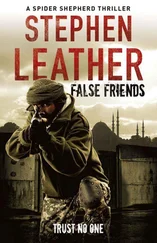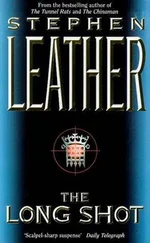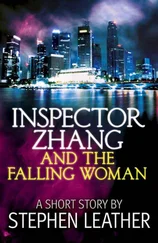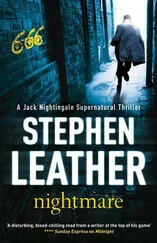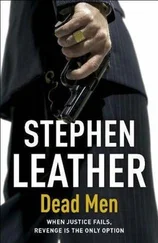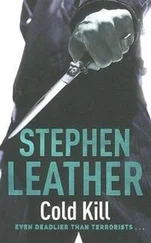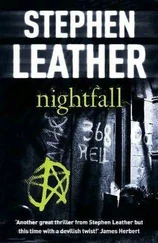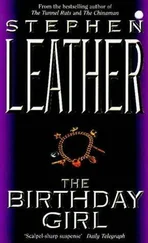She laughed. ‘No, they were too busy trying to look down my cleavage to worry too much about anything else.’
They made their way through the prison to the poorer sections at the rear, close to the punishment cells where Scouse was being held. There was a spare cell in one of the one-star sections, left empty after its previous inhabitant died. ‘And for once it was from natural causes,’ Ricardo said.
‘What do you know?’ Harper said. ‘Miracles do happen, even in San Pedro.’
Ricardo went off to find the boss of the section who was now the notional owner of the cell and, using a few more of Harper’s dollars, managed to rent it. ‘Sorry, he made me pay a month’s rent,’ he said when he returned, ‘twenty dollars’.
‘No problem,’ Harper said. ‘It’s a bargain.’ He looked the cell over. There were two narrow beds, a small table and a couple of chairs, a stove, fuelled by a gas bottle, and a sink in one corner. ‘A couple of beds - just right, because one of us is always going to have to be awake and on watch.’ He tested the door. It was solid hardwood and there were three locks on the inside. ‘You did well to get this, it’s strong and gives us good security.’
Ricardo nodded. ‘A bent politician used to have this cell when I was in here. He’d been running a scam that stole the savings of thousands of Bolivians, and blew most of it on supercars, casinos, fine wines, prostitutes and gambling in casinos. A few of the prisoners had relatives who’d been scammed by him, so he wasn’t expected to survive even one night in here, but he was shrewd enough to realise the danger he was in and took steps to protect himself. He paid a prisoner who was a safe-cracker to fit secure locks to the cell door and then locked himself in. He stayed there for days while the other prisoners yelled threats and curses at him through the door but eventually he paid Don Lorenzo enough to be under his protection, and after that no one dared touch him.’
‘Okay,’ Harper said. ‘This will do nicely. Now let’s get to work. We’ll take the surveillance of the punishment cells in four-hour shifts. We don’t need an actual sight of the cells themselves, we just need to be able to watch the passage leading to them, so we can see when people come and go, and we can do it from the café, or one of the benches in the courtyard during the day. At night we can keep watch from the doorway here. If we leave the lights off and the door ajar, we can spot anyone passing by, without showing ourselves. We need to record the times when anyone - guards, thugs, or anyone else - comes and goes. Lupa, you take the first shift.’ He handed her a few Bolivianos and a notebook and pen. ‘Buy yourself a beer or a coffee and keep your eyes open.’
‘And what are you and Ricardo going to be doing?’
‘We’re going to make a start on that simple chemistry, I told you about. Back in the sixteenth and seventeenth centuries British people called saltpetre men used to dig up the floors of stables, pig-sties, pigeon cotes, hen-huts and sheep-pens to get what was called “black earth” - full of urine and manure. They’d soak it to leach all the nitrates out of it then boil it in lead or copper vats to evaporate the liquid. The crystals that were left behind when all the liquid had boiled off were saltpetre, also known as nitrate, one of the three ingredients you need to make gunpowder. Mix 75 per cent saltpetre with 15 per cent charcoal and 10 per cent of the sulphur you got for me from the Andes, Ricardo, and hey presto! You’ve got black powder, the gunpowder that the Chinese invented and that was used in guns and explosives for a thousand years.
Human piss works just as well as animal. So we could dig up an earth-floored latrine, but it’ll be much easier to just scoop piss out of the concrete trough in the urinal. We could evaporate it in the sun but, since we don’t have much time, we’ll boil it up. That gives us our saltpetre. Charcoal is obviously easy to make, you can light a wood fire, cover it to block out the air so it smoulders rather than burns, and you’ve got charcoal, but since the blacksmith uses it in his forge, it’ll be quicker and easier to buy some from him.’
As Lupa headed for the café in the courtyard, Harper turned to Ricardo. ‘I need to go and see the guy at the forge,’ he said, ‘so I’m afraid that means you get the shitty end of the stick - quite literally in this case. I need you to get the biggest pan you can find in the kitchens, pay whatever you need to buy or borrow it, and then - here comes the hard part - I want you to fill it with piss from the trough in the latrine.’
‘You’re joking.’
‘I’m afraid not. Even worse, we’re then going to start boiling it up, so you’ll need to make sure there’s enough gas in that cylinder and buy some more if not. The stench will be absolutely terrible while we’re doing it, but it has to be done. That will give us one of the ingredients we need. Those pineapples that Lupa brought in contain another - the sulphur you got from the mountains - and I’ll be getting the third and last one - the charcoal - from the forge.’
Leaving Ricardo still shaking his head in disbelief, Harper went straight to the forge and spoke to the blacksmith. ‘You speak English, don’t you?’ he said.
‘A little.’
‘Good. I need to buy two things from you. I want to buy some of your charcoal - a couple of kilos will be enough - and I need you to make me a knife.’
‘Sure, how big?’
‘Well, you don’t want to take a penknife to a knife fight, do you? So I need something I can conceal but which is big enough to give me an edge - in both senses of the word - if I have to use it. Let’s say this big,’ he said to the blacksmith, holding his hands almost the width of his shoulders apart.
‘Okay, I’m busy now, maybe tomorrow.’
Harper shook his head and held up a $50 bill. ‘Are you this busy?’
‘Give me an hour,’ the blacksmith said, already reaching for a bar of scrap metal and signalling to his cell-mate to start pumping the bellows.
‘And the charcoal?’ Harper said.
The blacksmith just jerked his head towards the sacks in the corner. ‘Help yourself.’
When Harper came back an hour later, the blacksmith was just finishing working on the blade of a knife that was about a foot long. He repeatedly heated it and then plunged it into a bucket of water, sending clouds of steam billowing out of the door. ‘That hardens it,’ he said, ‘now it needs to be tempered - heated again, and then cooled more slowly.’
Harper watched, fascinated as he did that. ‘Now I just have to put an edge on it,’ the blacksmith said, working a foot pedal to send a grindstone spinning and then showering sparks in all directions as he held the blade against it. He swapped to a finer-grained grindstone for the final sharpening, tested the edge with his thumb and then held it out to Harper. The metal was still a little blued by the heat it had been exposed to, but the edge was cut-throat sharp.
‘Perfect,’ Harper said. ‘ Muchas gracias. ’ He slipped the knife into the back of his belt, handed the blacksmith the $50 note, and went back to the cell where the stench from twenty metres away showed that Ricardo was still stirring boiling urine.
Harper sent him to relieve Lupa on watch, but the smell was so bad that she stopped dead as she was approaching the cell and said. ‘Oh no, Lex. I don’t want to see what you’re doing in there, and I’m definitely not coming in to find out. I’ll be back at the café if you need me.’ She turned on her heel and went back across the courtyard.
It took the rest of the day and most of the night to convert sufficient urine to saltpetre crystals. They then used a rounded stone to reduce them to powder and then did the same with the charcoal from the forge, breaking the lumps apart with their fingers and then crushing them to powder with the stone. Harper then carefully weighed out the mixture of sulphur, saltpetre and charcoal, and blended them together with exaggerated care.
Читать дальше
